Best Inheritance Law Lawyers in St Peter Port
Share your needs with us, get contacted by law firms.
Free. Takes 2 min.
List of the best lawyers in St Peter Port, Guernsey
1. About Inheritance Law in St Peter Port, Guernsey
Inheritance law in Guernsey governs how a person’s assets are distributed after death. In St Peter Port this includes drafting valid wills, handling intestacy when there is no will, and administering estates through probate and distribution. Guernsey law blends local statutes with civil law concepts to cover wills, trusts, and estate administration. The process typically involves preparation by a solicitor, validation by the Royal Court, and administration by executors or administrators.
Because Guernsey is a Crown dependency with its own legal framework, residents often require tailored guidance on cross-border assets, offshore trusts, and the interaction with UK or Jersey assets. A Guernsey solicitor can explain how local rules apply to your situation and help you avoid common pitfalls such as ambiguity in a will or insufficient assets to cover debts. Understanding the basics now can prevent delays and disputes later on.
2. Why You May Need a Lawyer
Guernsey inheritance matters frequently involve complex asset structures, local rules, or family disputes. Here are concrete real-world scenarios where you would benefit from legal counsel in St Peter Port:
- A client dies without a Will, and their estate includes Guernsey property, a Guernsey bank account, and offshore trusts. A solicitor can determine the correct intestacy route, identify beneficiaries, and apply for probate.
- Several beneficiaries disagree about a Will draft that excludes a close family member. An advocate can help assess validity, explore potential challenges, and negotiate a settlement or prepare for Court hearings.
- Assets are held in a Guernsey trust and a beneficiary seeks to access or modify the trust arrangement. A solicitor can interpret the trust deed, advise on distributions, and address potential tax and AML implications.
- The death involves cross-border elements, such as UK real estate or foreign investments, requiring coordination between Guernsey probate procedures and foreign inheritance laws. A legal counsel can manage jurisdictional filings and ensure compliant transfer.
- There is a concern about estate debts or liabilities that could affect distributions to heirs. A Guernsey solicitor can inventory liabilities, prioritize creditors, and guide you through the administration process.
- A family seeks to plan future inheritance via a Guernsey trust or updated Will to protect minors or vulnerable adults. A solicitor can design a compliant and tax-efficient structure within Guernsey law.
3. Local Laws Overview
Guernsey inheritance matters rely on several key legal areas. The following are commonly cited statutes and regulations that shape practice in St Peter Port:
- The Wills and Probate Law (Guernsey) - this framework governs how Wills are prepared, validated, and administered, and the process by which estates are settled after death.
- The Trusts (Guernsey) Law - this statute provides the rules for creating and managing trusts, including family and discretionary trusts used in estate planning.
- Probate Rules and Administration Regulations - these rules govern the procedural steps for proving a Will, obtaining grants of probate or letters of administration, and distributing assets.
Recent updates in Guernsey practice emphasize clarity in Will drafting, careful treatment of cross-border estates, and increased transparency around trusts and AML requirements for professional advisers. For residents, understanding how these statutes interact with bank practices, property ownership, and guardianship arrangements is essential. Always verify the current titles and amendments with a local solicitor, as Guernsey statutes are subject to amendment and interpretation by the Royal Court.
For official guidance and current procedures, see government and regulatory resources:
- Official information on Wills, Probate, and estates from the Guernsey government: gov.gg
- Regulation of trusts and professional services that influence estate planning from the Guernsey Financial Services Commission: gfsc.gg
4. Frequently Asked Questions
What is probate and why is it needed in Guernsey?
Probate is the legal process to validate a Will and authorize the executor to administer the estate. It confirms the deceased's asset ownership and enables distributions to beneficiaries under Guernsey law.
How do I make a valid Will in St Peter Port?
Consult a Guernsey solicitor to draft a Will that complies with local formalities, includes witnesses, and clearly identifies executors and beneficiaries. Proper execution reduces the risk of disputes later.
What is intestacy in Guernsey?
Intestacy rules apply when there is no valid Will. The estate is distributed according to statutory shares to surviving relatives, which may differ from family expectations.
How long does probate normally take in Guernsey?
In Guernsey, probate timelines vary with complexity. Simple estates may take a few months; complex estates with offshore assets can extend to more than six months or longer.
Do I need a Guernsey solicitor for wills and probate?
Yes. A local solicitor understands Guernsey rules, can draft compliant documents, and handles Court filings to minimize delays and disputes.
Can I contest a Will in Guernsey?
Yes, but grounds are limited. Common grounds include lack of testamentary capacity, undue influence, or failure to comply with formal requirements. A lawyer can assess viability.
How much does probate cost in Guernsey?
Costs depend on estate value and complexity. A solicitor may charge hourly rates, with potential Court fees. A clear engagement letter helps manage expectations.
What documents are needed for probate in Guernsey?
Typical documents include the death certificate, the Will, property deeds, bank statements, and a list of assets and liabilities. Your solicitor will provide a tailored checklist.
Is there inheritance tax in Guernsey?
Guernsey does not have a standard inheritance tax, but certain estates may face other charges or solvent obligations. Consult a solicitor to understand any payable fees.
Should I use trusts to plan my estate in Guernsey?
Trusts can offer control over asset distributions and potential tax benefits. A Guernsey solicitor or fiduciary adviser can design a compliant structure.
Do I need witnesses for a Guernsey will?
Yes. A Will must be properly witnessed to be valid in Guernsey. A solicitor can ensure execution aligns with local requirements.
How are digital or electronic wills treated in Guernsey?
Digital or electronic wills may be recognized under local law, but require careful drafting and formalities. Confirm with a solicitor to ensure validity.
5. Additional Resources
- Gov.gg - Official guidance on Wills, Probate, and administration of estates. Provides information on how to apply for probate, related fees, and procedural steps. gov.gg
- Guernsey Financial Services Commission (GFSC) - Regulates trusts, fiduciaries, and professional service providers; offers guidance on compliance for estate planning and AML obligations. gfsc.gg
6. Next Steps
- Identify your goals and assets in Guernsey, including property, bank accounts, and offshore holdings. Expected time: 1-2 days.
- Consult a Guernsey solicitor to assess whether a Will needs updating or a new Will is required. Schedule a meeting within 1-2 weeks.
- Gather key documents: death certificate, existing Will, asset registers, and any trust deeds. Prepare a checklist with your solicitor within 1 week.
- Decide who should be Executor and Trustee roles. Get legal advice on duties, deadlines, and potential liabilities. Complete within 1-2 weeks after your initial consult.
- Have the Will and any trust instruments reviewed for Guernsey compliance, especially for cross-border assets. Allow 2-4 weeks for drafting and revisions.
- Submit probate or administration applications through the Royal Court with your solicitor. Timelines vary by estate complexity, typically 2-6 months.
- Communicate with creditors, beneficiaries, and involved institutions, keeping records of all correspondence. Ongoing throughout the process.
Lawzana helps you find the best lawyers and law firms in St Peter Port through a curated and pre-screened list of qualified legal professionals. Our platform offers rankings and detailed profiles of attorneys and law firms, allowing you to compare based on practice areas, including Inheritance Law, experience, and client feedback.
Each profile includes a description of the firm's areas of practice, client reviews, team members and partners, year of establishment, spoken languages, office locations, contact information, social media presence, and any published articles or resources. Most firms on our platform speak English and are experienced in both local and international legal matters.
Get a quote from top-rated law firms in St Peter Port, Guernsey — quickly, securely, and without unnecessary hassle.
Disclaimer:
The information provided on this page is for general informational purposes only and does not constitute legal advice. While we strive to ensure the accuracy and relevance of the content, legal information may change over time, and interpretations of the law can vary. You should always consult with a qualified legal professional for advice specific to your situation.
We disclaim all liability for actions taken or not taken based on the content of this page. If you believe any information is incorrect or outdated, please contact us, and we will review and update it where appropriate.











